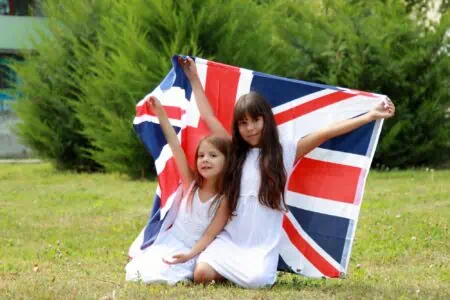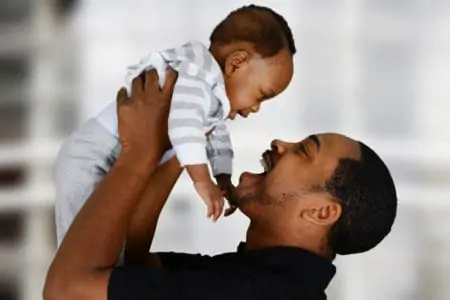People often think of British last names as plain or matter-of-fact. While many British surnames began as occupational or place names, there’s much more involved. You may go in with one question and come out with a dozen others.
Let us help you find your way through a long and storied history of British last names. You’ll easily find out where the names came from, how popular they are, and who’s using them now. You’ll also discover a bunch of unique facts along the way. Enjoy the tour!
100 Popular British Last Names
Delve into the land of king and country with these interesting UK last names ahead.
Ainsworth
Ainsworth comes from the Anglo-Saxon “’worth,” meaning “enclosure.” Ain was typically a first name based on a place name in Lancashire. It also means “’of Ainsworth” and is less common today.
- Origin: English
- Meaning: Aene’s Estate
- Pronunciation: AENS-werth
- Variations: Answorth
- Namesakes: Peter Ainsworth, a British Member of Parliament from 1992 to 2010. Raymond Ainsworth, an Australian rugby player for the St. George club.
- Popularity: Ainsworth is rare worldwide and mostly used in England, ranking 931st in 2014.
Allan
Allan comes from the Old English “aluinn,” meaning “fair.” It also means “little rock” and “harmony.” As an ancestral name, Alan means “the son of Alan.”
- Origin: English, Gaelic
- Meaning: Handsome
- Pronunciation: AL-Uhn
- Variations: Alan, Allen
- Namesakes: Mea Allan, a Scottish journalist for the Glasgow Herald. Denis Allan, a Canadian Open Chess Championship winner (1984).
- Popularity: Allan is rare worldwide, mainly used in England, and ranked 41st in Scotland in 2014.
Anderson
Anderson was a surname beginning with A given to a son or descendant of Andrew. It’s one of the most popular surnames in Canada and the 11th most common surname in the U.S. in 1990.
- Origin: English, Scandinavian
- Meaning: Son of Andrew
- Pronunciation: AN-duhr-Suhn
- Variations: Andersson
- Namesakes: Carl Anderson, an American physicist and 1936 Nobel Prize Winner in Physics. Martina Anderson, an Irish Member of the European Parliament for Northern Ireland from 2012 to 2020.
- Popularity: Anderson ranked 367th worldwide and is primarily used in the U.S., where it ranked 8th in 2014.
Atkinson
Atkinson is based on the Middle English first name Atkin, a pet form of Adam. It’s more common in Northern England and first appeared as Adekyn, which became Adkins and Atkins.
- Origin: English
- Meaning: The little Adam
- Pronunciation: AHT-kin-Sohn
- Variations: Atkins
- Namesakes: Cameron Atkinson, an American ice hockey player for the Philadelphia Flyers. Rowan Atkinson, an English actor in the TV series Mr. Bean (1990 to 1995).
- Popularity: Atkinson is uncommon worldwide and mostly used in England, ranking 120th in 2014.
Baker
Baker comes from the Old English “baecere,” meaning “to dry with heat.” It’s older than the 8th-century and refers to a baker of bread or someone with a communal oven.
- Origin: English
- Meaning: Baker (occupation)
- Pronunciation: BEY-ker
- Variations: Bakere
- Namesakes: Chesney “Chet” Baker, an American jazz trumpeter called the “Prince of Cool.” Russell Baker, an American author of the Pulitzer Prize-winning autobiography Growing Up (1983).
- Popularity: Baker ranked 694th worldwide and is mainly used in the U.S. and England, where it ranked 36th in 2014.
Bancroft
Bancroft is based on the Old English “bēan,” meaning “beans,” and “croft,” meaning “paddock.” It was first used in the 13th-century and also means “dweller by the bean field.”
- Origin: English
- Meaning: Field of beans
- Pronunciation: BAEN-Kroft
- Variations: Bancrofte
- Namesakes: Anne Bancroft (born Anna Italiano), an American actress known for the film The Graduate (1967). John Bancroft, a 16th-century bishop of Oxford.
- Popularity: Bancroft is very rare worldwide and primarily used in Jamaica, where it ranked 1,192nd in 2014.
Bell
Bell was an occupational name for a “bell maker” or anyone living near a house or inn sign. It also refers to “the son of Bell” and is the 67th most popular surname in the U.S.
- Origin: English
- Meaning: Bell-ringer
- Variations: Belle
- Namesakes: Alexander Graham Bell, a Scottish-American inventor of the telephone. Emily Bell, a British journalist for The Guardian newspaper.
- Popularity: Bell ranked 874th worldwide, is mostly used in the U.S. and ranked 19th in Northern Ireland in 2014.
Berrycloth
Berrycloth comes from the Old English “beara,” meaning “grove,” and “cloh,” meaning “ravine.” It later became Barraclough and is one of the rarest English surnames.
- Origin: English
- Meaning: From Barrowclough
- Pronunciation: BEH-ree-kloth
- Variations: Bereclough, Barrayclught
- Popularity: Berrycloth is extremely rare worldwide, with only 15 people named Berrycloth in 2014 in England.
Birdwhistle
Birdwhistle contains the English root “brid,” meaning “young bird” and “twissel,” meaning “a fork in a stream.” Birdwhistle is one of the most obscure English last names that barely exists anymore.
- Origin: English
- Meaning: Young bird
- Pronunciation: BERD-wih-Sel
- Variations: Birtwhistle
- Popularity: Birdwhistle is extremely rare worldwide, with only 13 people named Berrycloth in 2014 in the U.S., Australia, and Wales.
Black
Black comes from the Old English “blæc,” a nickname for a “dark-haired man.” Black is currently the 174th most popular surname in the U.S. and is as straightforward as they come.
- Origin: English
- Meaning: Dark-haired man
- Pronunciation: BLAEK
- Variations: Blacke
- Namesakes: Lewis Black, an American comedian who appeared on The Daily Show. Tarik Black, an American football player for the New York Jets.
- Popularity: Black ranked 1,739th worldwide, is mainly used in the U.S. and ranked 44th in Scotland in 2014.
Browning
Browning is a Victorian last name that means “the son of Browning” in English. It’s based on the Old English “bruning” and is popular in England, Canada, Australia, and the U.S.
- Origin: English
- Meaning: Dark-haired man
- Pronunciation: BRAUWN-ing
- Variations: Brownyng
- Namesakes: Kurt Browning, a Canadian figure skater, and a four-time World Champion. Robert Browning, an English Victorian poet, known for his book Pauline (1833).
- Popularity: Browning is rare worldwide, primarily used in the U.S., and ranked 550th in Wales in 2014.
Campbell
Campbell began as a nickname for a clan member who was “wry-mouthed.” Despite being Gaelic, it’s one of the best-known UK last names today.
- Origin: Gaelic, British
- Meaning: Crooked mouth
- Pronunciation: KAEM-Bahl
- Variations: Cambell
- Namesakes: Avril Campbell, the 19th prime minister of Canada, in 1993. Joseph Campbell, an American writer, best known for The Hero with a Thousand Faces.
- Popularity: Campbell ranked 657th worldwide, is mostly used in the U.S. and ranked #1 in Northern Ireland in 2014.
Chapman
Chapman comes from the Old English “céapmann,” meaning “marketman” and “monger.” The verb “éapan” means “to buy or sell” and refers to a “peddler” selling his wares at the market.
- Origin: English
- Meaning: Merchant, trader
- Pronunciation: CHAEP-muhn
- Variations: Caepmon, Cepman
- Namesakes: Hayley Chapman, an Australian sport shooter who competed at the 2012 Summer Olympics. Simon Chapman, a British children’s writer known for the Explorers Wanted! Series.
- Popularity: Chapman ranked 1,803rd worldwide, is mainly used in the U.S., and ranked 75th in England in 2014.
Clark
Clark began as an official title for a “clerk,” whether secular or religious. The surname O’Clery often appears as Clark. It’s the 25th most popular surname in the U.S. and means “scribe” or “scholar.”
- Origin: English
- Meaning: Clerk
- Pronunciation: KLAARK
- Variations: Clarke
- Namesakes: Steve Clark, an English musician, and member of the hard rock band Def Leppard. Ciaran Clark, an English footballer for Sheffield United.
- Popularity: Clark ranked 545th worldwide, is primarily used in the U.S. and ranked 14th in Scotland in 2014.
Cole
Cole also means “swarthy” and “charcoal.” It’s based on the French first name Coule, a nickname for Nicholas. As a boy’s name, Cole has ranked in the top 200 names in the U.S. every year of the 21st-century.
- Origin: English
- Meaning: Coal-black
- Pronunciation: KOWL
- Variations: Col
- Namesakes: Gary Cole, an American actor currently appearing on the TV series NCIS. Leah Cole Allen, an American politician in the Massachusetts House of Representatives.
- Popularity: Cole ranked 1,186th worldwide and is mostly used in the U.S., ranking 108th in 2010.
Cooper
Cooper referred to someone who made wooden objects as an occupation. It derives from the Middle English “couper,” meaning “container.”
- Origin: English
- Meaning: Barrel tub maker
- Pronunciation: KUW-Per
- Variations: Couper
- Namesakes: Bill Cooper, an American football player for the San Francisco 49ers. D.B. Cooper, an unidentified hijacker on a Northwest Orient Airlines flight in November 1971 who disappeared.
- Popularity: Copper ranked 821st worldwide and is mainly used in the U.S., where it ranked 70th in 2010.
Corbyn
Corbyn was originally a surname used for a person with dark hair. It traces back to the French “corbeau,” meaning “raven.” Corbyn could have originated from the Roman family name Corvinus, meaning “raven.”
- Origin: British, Latin
- Meaning: Raven
- Pronunciation: COHR-bin
- Variations: Corbin
- Namesakes: Jeremy Corbyn, the British Leader of the Labour Party from 2015 to 2020. Frederick Corbyn, an English founder of The India Review of Works on Science.
- Popularity: Corbyn is very rare worldwide and primarily used in England.
Cornish
Cornish is an abbreviation of Cornwallis, the Welsh name for a family from Cornwall. It also appeared as the Norman Corneys but connotes all things Cornish, from pastry to mining.
- Origin: English, Welsh
- Meaning: From Cornwall
- Pronunciation: KORN-ish
- Namesakes: Joseph Cornish, an English comedian who co-wrote The Adventures of Tintin. Audie Cornish, an American co-host of NPR’s All Things Considered.
- Popularity: Cornish is rare worldwide, mostly used in the U.S., and ranked 770th in Australia in 2014.
Culpepper
Culpepper first appeared as “de Colepeper” in the 12th-century in Kent. It’s composed of the English “cul(l)en,” meaning “to cull,” and “pepper,” an occupational name for a “herbalist.”
- Origin: British
- Meaning: Pepper gatherer
- Pronunciation: KULL-pep-Ehr
- Variations: Culpeper
- Namesakes: Alan Culpepper, an American runner and two-time U.S. Olympian in 2000 and 2004. Marvin Culpepper, an American member of the Louisiana House of Representatives from 1964 to 1968.
- Popularity: Culpepper is rare worldwide and mainly used in the U.S.
Dankworth
Dankworth may be based on the German first name “Tancred.” Combined with the English “worth,” it refers to a “farmstead.” Dankworth is one of the rarest English last names on the list.
- Origin: English, German
- Meaning: Farmstead
- Pronunciation: DAANK-wurth
- Namesakes: Jacqueline Dankworth, a British jazz singer and appointed Member of the Order of the British Empire in 2019. John Dankworth, an English jazz musician in the band Johnny Dankworth and His Orchestra.
- Popularity: Dankworth is very rare worldwide and primarily used in the U.S.
Davidson
Davidson refers to any “descendant of David.” It also means “beloved one” when based on the Hebrew David. Davidson is well-known as a Scottish family name that dates to the 14th-century.
- Origin: English, Scottish
- Meaning: Son of David
- Pronunciation: DAY-vihd-Suhn
- Variations: Davidsson
- Namesakes: Peter Davidson, an American comedian appearing on Saturday Night Live from 2014 to 2022. Carolyn Davidson, an American graphic designer, known for designing the Nike Swoosh logo.
- Popularity: Davidson is uncommon worldwide, mostly used in the U.S., and ranked 26th in Scotland in 2014.
Dawson
Dawson also means “son of Dawe,” which is another form of David. It may also mean “son of Daud(e),” a Middle English version of Ralph.
- Origin: English, Scottish
- Meaning: Son of David
- Pronunciation: DAW-suhn
- Namesakes: Richard Dawson (born Colin Emm), an English-American host of Family Feud from 1976 to 1985. Geralyn Dawson, an American romance novel author with titles on the New York Times Best Seller list.
- Popularity: Dawson is uncommon worldwide, mainly used in the U.S., and ranked 128th in England in 2014.
Eastaughffe
Eastaughffe consists of “east” and the Danish “toft,” meaning “homestead.” It may have originated in northeastern England or Scotland and is among today’s least-heard English surnames.
- Origin: English
- Meaning: Enclosed homestead
- Pronunciation: EAST-off
- Popularity: Eastaughffe is extremely rare worldwide and primarily used in Australia.
Edward
Edward is associated with the Old English first name “Eadward.” Edward refers to “the son of Edward” and is the 800th most common surname globally.
- Origin: English, Welsh
- Meaning: Prosperous guardian
- Pronunciation: EHD-Wahrd
- Variations: Edwards
- Namesakes: John Edward, an American TV personality and psychic medium. Trevelyan Edward, a Sri Lankan cricketer for Ceylon between 1961 and 1965.
- Popularity: Edward ranked 1,987th worldwide and is primarily used in Tanzania, ranking 42nd in 2014.
Elliott
Elliott derives from a version of the first name Elias or Elijah. The Scottish Elliott is associated with the Gaelic Elloch, meaning a “dam” or “bank.” Elliott also means “the son of Elias” for a long line of English “e” names.
- Origin: English, Scottish
- Meaning: My God is Yahweh
- Pronunciation: EHL-liy-Eht
- Variations: Eliot, Eliott
- Namesakes: Joe Elliott, an English singer, and member of the hard rock band Def Leppard. Francis Elliott, a British political editor of The Times from 2013 to 2021.
- Popularity: Elliott ranked 1,798th worldwide and is mainly used in the U.S., where it ranked 210th in 2010.
Enfield
Enfield is a place name in Middlesex, England. It comes from the Old English “ēan,” meaning “lamb,” and “feld,” meaning “open field.”
- Origin: English
- Meaning: Field of lambs
- Pronunciation: EHN-Feeld
- Variations: Enffield
- Namesakes: Henry Enfield, an English comedian known for Harry Enfield’s Television Programme sketch show. Michael Enfield, an American soccer player for SP Barcelona.
- Popularity: Enfield is rare worldwide and primarily used in the U.S.
Everly
Everly may be based on Everleigh in Wiltshire. It’s made up of the Old English “eofor,” meaning “wild boar” and “lēah,” meaning “woodland clearing.” It dates back to pre-7th-century England as one of the oldest names in the UK.
- Origin: English
- Meaning: Boar’s wood
- Pronunciation: EH-ver-Lee
- Variations: Everley
- Namesakes: Isaac “Don” Everly, one-half of the Everly Brothers country rock band. Jack Everly, the American Principal Pops Conductor with the Baltimore Symphony Orchestra.
- Popularity: Everly is rare worldwide and primarily used in the U.S.
Featherstonhaugh
Featherstonhaugh was a place in Northumberland in Northern England. It comes from the Old English “feðere,” meaning “feather,” “stān,” meaning “stone,” and “healh,” meaning “corner.”
- Origin: English
- Meaning: Feather stone corner
- Pronunciation: FEH-thers-Ton-Haw
- Variations: Featherstonehaugh
- Namesakes: George Featherstonhaugh, an American member of the Wisconsin House of Representatives from 1846 to 1848. Rupert “Buddy” Featherstonhaugh, an English jazz saxophonist with the BBC Radio Rhythm Club Sextet from 1943 to 1945.
- Popularity: Featherstonhaugh is extremely rare worldwide and mainly used in Canada and England.
Featherswallow
Featherswallow either referred to a “trader” or a person “resembling a bird.” There’s almost nothing known about this obscure English surname. In 1974, Led Zeppelin’s Robert Plant guest starred on The Brady Bunch as cousin Oliver’s biological father. His name was Nigel Featherswallow.
- Origin: English
- Meaning: Trader
- Pronunciation: FEH-ther-SWAH-low
Fisher
Fisher is based on the Old English “fiscere,” meaning “fisherman.” It’s also an English spelling of the German and often Ashkenazi Jewish Fischer, used by many immigrants to the U.S.
- Origin: English, Jewish
- Meaning: Fisherman
- Pronunciation: FIH-shur
- Variations: Fish, Fishe
- Namesakes: Isla Fisher, an Australian actress known for the Australian soap opera Home and Away. Lotan Fisher, an Israeli bridge player, ranked as a World Life Master by the World Bridge Federation.
- Popularity: Fisher ranked 1,230th worldwide and is primarily used in the U.S., ranking 112th in 2010.
Ford
Ford was a surname given to anyone who lived near “a river crossing.” The Old English “ford” means “pass.” It’s best known as the American Ford Motor Company, the first maker of modern-day automobiles.
- Origin: English
- Meaning: Crossing
- Namesakes: Henry Ford, an American industrialist and founder of the Ford Motor Company. Lita Ford, an English-American musician and lead guitarist for the Runaways rock band.
- Popularity: Ford ranked 1,551st worldwide, is mostly used in the U.S., and ranked 93rd in Wales in 2014.
Garfield
Garfield comes from the Middle English “gar(e),” meaning “triangular piece,” and “feld,” meaning “open country field.” It also referred to someone from a “lost or unidentified place” without a name.
- Origin: English
- Meaning: Spear field
- Pronunciation: GAHR-feeld
- Variations: Garfeild
- Namesakes: James Garfield, the 20th president of the U.S. from March 1881 until his assassination in September 1881. Richard Garfield, an American mathematician who created Magic: The Gathering.
- Popularity: Garfield is rare worldwide and mainly used in the U.S.
Gibson
Gibson first appeared as Gislebertus in the 1086 Domesday Book in England. It’s taken from the personal name Gibb, a nickname for Gilbert. Gibson is more common in Ireland and Northern Ireland today.
- Origin: English, Scottish
- Meaning: Son of Gilbert
- Pronunciation: GIHB-suhn
- Variations: Gibbson
- Namesakes: Thomas Gibson, an American actor known for the TV series Criminal Minds (2005 to 2016). Orville Gibson, an American founder of the Gibson Guitar Company in 1902.
- Popularity: Gibson ranked 1,341st worldwide, is primarily used in the U.S., and ranked 48th in Northern Ireland in 2014.
Graham
Graham was the famous surname of an Anglo-Norman family in 12th-century Scotland. The posh Graham family originally descended from Chief Greme, and their fame made it sophisticated.
- Origin: English, Scottish
- Meaning: Gravelly homestead
- Pronunciation: GRAEM
- Variations: Grahame
- Namesakes: Billy Graham, an American evangelist and one of the most famous Christian leaders of the 20th-century. Jorie Graham, an American poet, and winner of the Pulitzer Prize for Poetry (1996).
- Popularity: Graham ranked 1,185th worldwide and is mostly used in the U.S., where it ranked 120th in 2010.
Granger
Granger was once an occupational name for a “farm bailiff” who collected rent. It derives from the Old French “grange,” meaning “barn,” and the Latin “granum,” meaning “grain.”
- Origin: English, France
- Meaning: Bailiff
- Pronunciation: GREYN-gher
- Variations: Grainger
- Namesakes: Dorothy Karolyn Granger, an American comedic actress who starred in films with Laurel & Hardy. Keil Granger, a member of the Utah House of Representatives from 1932 to 1937.
- Popularity: Granger is rare worldwide, mainly used in the U.S., and ranked 453rd in France in 2014.
Grant
Grant is based on the French “graund,” meaning “great in size.” It was a nickname given to a large or tall person. Grant also has origins with the English first names Grante and Grente.
- Origin: English, French
- Meaning: Large
- Pronunciation: GRAHNT
- Variations: Grante
- Namesakes: Ulysses S. Grant, the president of the U.S. from 1869 to 1877. Lou Grant, an American syndicated political cartoonist for the Los Angeles Times.
- Popularity: Grant ranked 1,504th worldwide and is primarily used in the U.S., ranking 196th in 2010.
Griffiths
Griffiths is based on the Old English “griff,” meaning “strong grip,” and “udd,” meaning “chief.” Griffiths is the English variation of the original Welsh Gruffydd. The first Griffiths appeared as Gryffyth in 1295, with many fancy descendants to follow.
- Origin: English, Welsh
- Meaning: Prince
- Pronunciation: GRIH-Fihths
- Variations: Griffith
- Namesakes: Ciarán Griffiths, an English actor known for the Shameless TV series. Barri Griffiths, a Welsh wrestler with the ring name Mason Ryan in the WWE.
- Popularity: Griffiths is uncommon worldwide, mostly used in England, and ranked 10th in Wales in 2014.
Hall
Hall comes from the Old Norse “holl,” referring to “a spacious residence.” Hall might also mean “forgiving” and was given to a person who worked in a classy manor house.
- Origin: English, Norse
- Meaning: Spacious house
- Pronunciation: HAWL
- Variations: Halle
- Namesakes: Daryl Hohl (known as Daryl Hall), an American rock musician and co-founder of Hall and Oates. Halsey Hall, a sports reporter in Minneapolis–Saint Paul from 1919 until the 1970s.
- Popularity: Hall ranked 591st worldwide and is mainly used in the U.S., ranking 45th in 2014.
Hamilton
Hamilton was a place name in both England and Scotland used since the 3rd-century. It’s taken from the Old English “hamel,” meaning “crooked,” and “dūn,” meaning “hill.”
- Origin: English, Scottish
- Meaning: Crooked hill
- Pronunciation: HAM-ihl-Tuhn
- Variations: Hamelton
- Namesakes: George Hamilton, an American actor who won a Golden Globe Award for Crime and Punishment USA in 1959. Margaret Hamilton, an American Union nurse during the Civil War.
- Popularity: Hamilton ranked 1,322nd worldwide and is mostly used in the U.S., where it ranked 119th in 2010.
Harris
Harris comes from the medieval first name Harry, a nickname for Henry. It’s also an Anglo spelling of the much more complicated Gaelic Ó’Earchadha.
- Origin: English, Gaelic
- Meaning: Son of Harry
- Pronunciation: HHAH-Rihs
- Variations: Haris
- Namesakes: Richard Harris, an Irish actor known for the 1967 film Camelot. Christie Harris, a Canadian children’s writer known for the 1966 novel Raven’s Cry.
- Popularity: Harris ranked 482nd worldwide, is mainly used in the U.S., and ranked 14th in New Zealand in 2014.
Hatt
Hatt was the surname given to anyone who made or sold hats. It’s based on the Old English “hætt,” the word for “hat.” Hatt is rare these days but is probably the most literal of British last names around.
- Origin: English
- Meaning: Hat
- Variations: Hat
- Namesakes: John Hatt, an English travel editor and founder of Eland Books in 1982. Rona Hatt, a Canadian scientist, and Canada’s first female Chemical Engineer.
- Popularity: Hatt is rare worldwide and primarily used in the U.S.
Hill
Hill also referred to “a person who lived on a hill.” It consists of the Old English “hyll,” which became the medieval first name Hill.
- Origin: English
- Meaning: Sloping ground
- Pronunciation: HIHL
- Variations: Hille, Hills
- Namesakes: Henry Hill, an American mobster whose story was portrayed in the 1990 film Goodfellas. Albert Hill, a British equestrian and gold medalist at the 1956 Summer Olympics.
- Popularity: Hill ranked 677th worldwide and is primarily used in the U.S., ranking 39th in 2010.
Hughes
Hughes originated as the Irish Ó’Aodha, given to a “descendant of Aodh.” Aodh means “fire” and becomes Hugh in English, still a powerful Gaelic name in disguise.
- Origin: English, Irish
- Meaning: Son of Hugh
- Pronunciation: HYOOZ
- Variations: Hughs
- Namesakes: Sergio Hughes, a Sint Maarten footballer for the Sint Maarten national team. Janis Hughes, a Member of the Scottish Parliament from 1999 to 2007.
- Popularity: Hughes ranked 921st worldwide and is mostly used in the U.S., where it ranked 90th in 2010.
Hunter
Hunter may have begun as a title for a “man who hunts” in ancient Scotland. It originated with the Latin “venator” and is cool as a first and last name.
- Origin: English, Scottish
- Meaning: Hunter
- Pronunciation: HHUHNT-er
- Namesakes: Evan Hunter (born Salvatore Lombino), an American author known for his 87th Precinct novels. Ian Hunter, an English musician and lead singer of the English band Mott the Hoople.
- Popularity: Hunter ranked 1,648th worldwide, is mainly used in the U.S. and ranked 35th in Scotland in 2014.
Jackson
Jackson means “son of John” and originated somewhere between England and Scotland. It’s connected to the first name Jack, a nickname for John, meaning “God has favored.”
- Origin: English
- Meaning: God has favored
- Pronunciation: JHAHK-suhn
- Variations: Jacksone
- Namesakes: Michael Jackson, a famous American singer called “King of Pop.” Kenneth Jackson, Chile’s current Minister of Social Development.
- Popularity: Jackson ranked 383rd worldwide and is primarily used in the U.S., where it ranked 16th in 2014.
James
James may have rich Scottish roots with the first name Jamison. It has an elegant royal feel and is pretty popular, thanks to King James VI.
- Origin: English
- Meaning: Son of James
- Pronunciation: JEYMZ
- Namesakes: Angela James, a Canadian ice hockey player in the Central Ontario Women’s Hockey League. Kevin James, an American comedian, known for The King of Queens TV series from 1998 to 2007.
- Popularity: James ranked 344th worldwide, is primarily used in Nigeria, and ranked 85th in the U.S. in 2010.
Jarsdel
So little is known about Jarsdel other than it’s believed to have German origins. There are no popularity stats for this almost extinct name with quite a peculiar and interesting meaning.
- Origin: English, German
- Meaning: Opening part of a jar
- Pronunciation: JAARS-dehl
- Variations: Jarsel
Jenkins
Jenkins comes from the first name Jenkin, composed of “Jen,” a nickname for John, and the “-kin suffix. It also means “son of John” and may be a fancy vintage way of saying “John the younger.”
- Origin: English
- Meaning: Little John
- Pronunciation: JEHN-kihnz
- Variations: Jenkin
- Namesakes: Henry Jenkins, the 26th Speaker of the Australian House of Representatives from 2008 until 2011. Robert Jenkins, an American sports announcer called the “Voice of the Indianapolis 500.”
- Popularity: Jenkins ranked 1,398th worldwide, is mainly used in the U.S. and ranked 16th in Wales in 2014.
King
King is the shortest example of a title for a king, versus Caesar, Kaiser, and Emperor. It’s based on the Old English “cyning,” meaning “tribal leader.” King was also used for anyone who served in a royal household.
- Origin: English
- Meaning: Title of the king
- Namesakes: Don King, an American boxing promoter known for “The Rumble in the Jungle” in 1974. Stephen King, an American author, called the “King of Horror.”
- Popularity: King ranked 592nd worldwide and is primarily used in the U.S., where it ranked 34th in 2014.
Knight
Knight is a well-known title for a “military man.” It comes from the Middle English “knyghte,” meaning “knight.” Knight was also used for those working in a knightly household or someone who won a contest of skill.
- Origin: English
- Meaning: Man-at-arms
- Pronunciation: Knights
- Variations: NIYGHT
- Namesakes: Jabez Knight, the mayor of Providence, Rhode Island from 1859 to 1864. Wayne Knight, an American actor, known for Seinfeld (1992 to 1998).
- Popularity: Knight ranked 1,828th worldwide, is mostly used in the U.S. and ranked 88th in England in 2014.
Lewis
Lewis came to England via the Normas. It could also be associated with the Welsh Llywelyn, meaning “like a lion,” and Latin Ludovicus, meaning “famed battle.”
- Origin: English, Welsh
- Meaning: Son of Lewis
- Pronunciation: LUW-ihs
- Variations: Louis
- Namesakes: C.S. Lewis, a British writer known for The Chronicles of Narnia. Hugh Cregg III (known as Huey Lewis), an American singer with Huey Lewis and the News.
- Popularity: Lewis ranked 546th worldwide, is mainly used in the U.S. and ranked 7th in Wales in 2014.
Loughty
Loughty consists of the Scottish root “loch,” meaning “lake” or “inlet.” It includes a diminutive “-ty” suffix, meaning “by a small lake.” Loughty is connected to Lochty, Scotland, so it’s the most Scottish of UK last names.
- Origin: English, Scottish
- Meaning: Near a small lake
- Pronunciation: LAOW-tey
- Variations: Lochty
- Popularity: Loughty is extremely rare worldwide, with only three occurrences of Loughty in 2014, in Scotland.
Marshall
Marshall is based on the Frankish “mare,” meaning “horse,” and “skalkos,” meaning “servant.” It’s also an Anglo version of the Jewish-German Marschall. Marshall means “master of horses” in French – perfect for a horse lover’s name.
- Origin: English, French
- Meaning: Love of horses
- Pronunciation: MAAR-Shahl
- Variations: Marshal
- Namesakes: Robert Marshall, the Mayor of San Bruno, California, from 1980 to 1991. Penelope Marshall, a New Zealand swimmer and silver medalist at the 2010 Commonwealth Games.
- Popularity: Marshall ranked 1,285th worldwide and is primarily used in the U.S., ranking 139th in 2010.
Mason
Mason has been used worldwide as an occupational name for a “stone worker.” It’s based on the Old French “masson,” meaning “stone.” Mason is both a traditional surname and a popular boy’s name.
- Origin: English, French
- Meaning: Stonemason
- Pronunciation: MAY-son
- Variations: Maison, Mayson
- Namesakes: Jackie Mason (born Yacov Maza), an American stand-up comedian whose 1986 show The World According to Me! won a Special Tony Award. Martha Mason, an American dancer and artistic director of the Boston Snappy Dance Theater.
- Popularity: Mason ranked 1,479th worldwide, is mainly used in the U.S. and ranked 76th in England in 2014.
Miller
Miller was a surname given to someone “who grinds corn” or a “milner.” It’s the 7th most popular surname in the U.S. Miller may also be connected to the Gaelic “malair,” meaning “merchant.”
- Origin: English
- Meaning: Miller (one who mills)
- Pronunciation: MIH-luhr
- Variations: Milner
- Namesakes: Jason Miller, an American actor known for the 1973 horror film The Exorcist. Nathaniel Miller, a Canadian water polo player and bronze medalist at the Pan American Games.
- Popularity: Miller ranked 299th worldwide and is primarily used in the U.S., ranking 7th in 2014.
Mitchell
Mitchell is derived from the Middle English “michel,” meaning “big.” It’s a version of the first name Michael, meaning “one who is like God.” Mitchell also means “the son of Michael,” in a long line of British surnames.
- Origin: English, Scottish
- Meaning: Big
- Pronunciation: MITCH-ehl
- Variations: Michell
- Namesakes: Lauren Mitchell, an Australian artistic gymnast, and the 2010 World champion. Andrew Mitchell, a British Member of Parliament since 2001.
- Popularity: Mitchell ranked 752nd worldwide, is mostly used in the U.S. and ranked 18th in Scotland in 2014.
Morris
Morris also means “the son of Maurice.” It’s connected to the Norman “de Marisco,” meaning “of the marsh.” Morris could be born out of Morres, a place name for a “family living on the Moors.”
- Origin: English
- Meaning: Of the moors
- Pronunciation: MAOR-ihs
- Variations: Moris
- Namesakes: Errol Morris, an American documentary film director known for The Fog of War film. Natali Morris, an American technology news journalist with CNET.
- Popularity: Morris ranked 773rd worldwide, is mainly used in the U.S., and ranked 18th in Wales in 2014.
Murray
Murray comes from the widely-used Moray, based on the Gaelic “Muireb,” an ancient kingdom in Scotland. It comes from the Gaelic “moireabh,” meaning “seaboard settlement,” for another Scottish-influenced example of English surnames.
- Origin: English, Gaelic
- Meaning: Seaboard settlement
- Pronunciation: MUH-Riy
- Namesakes: Andy Murray, a Scottish-British tennis player, ranked world No. 1 for 41 weeks. Bill Murray, an American comedian who started on Saturday Night Live from 1977 to 1980.
- Popularity: Murray ranked 1,164th worldwide, is primarily used in the U.S. and ranked 11th in Scotland in 2014.
Natt
Natt may be associated with the Hebrew Natan, meaning “given.” It’s also based on the English first name Nathaniel. Natt is the name of the Sikh Jat clan, which is why it’s so popular in India.
- Origin: English, Jewish
- Meaning: Given
- Pronunciation: NAHT
- Namesakes: Calvin Natt, an American basketball player with the Denver Nuggets. Ted Natt, a Pulitzer Prize-winning publisher of the Longview Daily News.
- Popularity: Natt is rare worldwide, mainly used in India, and ranked 499th in Liberia in 2014.
Nightingale
Nightingale began as a nickname for a person with a good voice. It comes from the Old English “nihtegale,” composed of “niht,” meaning “night,” and “galan,” meaning “sing.” Nightingale birds are well-known for their lovely singing voice.
- Origin: English
- Meaning: Nightingale (bird species)
- Pronunciation: NIHT-ing-GALE
- Variations: Nightingall
- Namesakes: Annie Nightingale, an English broadcaster and the first female presenter on BBC Radio 1. Florence Nightingale, the English founder of modern nursing.
- Popularity: Nightingale is rare worldwide and mainly used in England, where it ranked 902nd in 2014.
Nithercott
Nithercott is a lesser-known surname referring to someone from Nethercote, a village in Northamptonshire. It’s composed of the Middle English “nether,” meaning “lower,” and “cot,” meaning “cottage.”
- Origin: English
- Meaning: Of Nethercote
- Pronunciation: NIH-ther-Cott
- Variations: Nethercott
Nutler
Nutler may be the most unknown of English last names. There are no meanings listed nor any popularity stats. It’s an obscure name only listed in the Urban Dictionary as a combination of “nurse” and “butler.”
- Origin: English
- Meaning: Unknown
- Pronunciation: NUT-lehr
- Popularity: Nutler is extremely rare worldwide, with only three people named Nutler in 2014, all in the U.S.
Osbourne
Osbourne also means “the son of Osbern.” It may be a Viking name based on the Old Norse Asbjorn, meaning “divine bear.” Osbourne also means “god warrior.”
- Origin: English, Norse
- Meaning: Divine bear
- Pronunciation: OZ-born
- Variations: Osborne, Osbern, Osborn
- Namesakes: Ozzy Osbourne, an English musician with the heavy metal band Black Sabbath. Samuel Osbourne, an American author who co-authored The Wrecker with his stepson, Robert Louis Stevenson.
- Popularity: Osbourne is rare worldwide and primarily used in the U.S.
Owen
Owen also means “the son of Owen.” It’s an Anglo spelling of the Welsh first name Owain. Owen is also a boys’ name, ranked in the top 100 since 2002.
- Origin: English, Welsh
- Meaning: Noble born
- Pronunciation: OWAHN
- Variations: Owens
- Namesakes: Clive Owen, an English actor known for the film Closer (2004). Nora Owen, the Irish Deputy Leader of Fine Gael from 1993 to 2001.
- Popularity: Owen is uncommon worldwide, mostly used in the U.S., and ranked 15th in Wales in 2014.
Painter
Painter comes from the Old English “peintour,” referring to someone who paints. It originally was the occupational name for “a painter of stained glass,” but it soon covered anyone who picked up a brush.
- Origin: English
- Meaning: Painter (occupation)
- Pronunciation: PAYNE-ter
- Namesakes: Kevin Painter, an English darts player and winner of the Players Championship Finals in 2011. Ian Painter, an English footballer for Coventry City.
- Popularity: Painter is rare worldwide and mainly used in the U.S., where it ranked 1,512th in 2014.
Pastor
Pastor originated with the Latin “pastus,” meaning “shepherd.” It also became the occupational name for a clergyman. Pastor often occurs as the Italian Pastore, but its meaning is known far and wide.
- Origin: English, Latin
- Meaning: Clergyman
- Pronunciation: PASS-tohr
- Variations: Pastore
- Namesakes: George Pastor, an American soccer player with the U.S. national team. Thierry Pastor, a French singer known for the 1980s song “Le Coup de folie.”
- Popularity: Pastor is uncommon worldwide and primarily used in Spain, ranking 89th in 2014.
Peterson
Peterson is based on the Greek Petros, meaning “rock” or “stone.” It became the first name Peter and is also commonly used in Scandinavia as a surname.
- Origin: English, Scandinavian
- Meaning: Son of Peter
- Pronunciation: PEE-tur-Suhn
- Variations: Petersson
- Namesakes: James Peterson, a member of the House of Commons of Canada from 1980 to 1984. Thomas Peterson, the first African-American to vote in an election.
- Popularity: Peterson ranked 1,240th worldwide and is mainly used in the U.S., where it ranked 71st in 2010.
Patterson
Patterson is a variation of Patrickson, meaning “son of Patrick.” It first became Patrison and then Patterson. Patterson goes back to the Roman first name Patricius, meaning “nobleman.”
- Origin: English, Scottish
- Meaning: Son of Patrick
- Pronunciation: PAET-er-Sahn
- Variations: Paterson
- Namesakes: Ottilie Patterson, a Northern Irish blues singer who performed with the Chris Barber Jazz Band. James Patterson, an American author who has sold over 425 million books.
- Popularity: Patterson ranked 1,588th worldwide, is mainly used in the U.S., and ranked 38th in Northern Ireland in 2014.
Quill
In English, Quill means “feather.” It’s also the English version of the Irish Ó’Cuill, meaning “hazel tree.” Quill is mainly used in Ireland today and is a unique version of a boy’s name.
- Origin: English, Irish
- Meaning: Plume
- Pronunciation: KWILL
- Variations: Coill, O’Coill
- Namesakes: John Quill, an Irish-American rugby union player for the U.S. men’s national team. Mike Quill, an Irish-American founder of the Transport Workers Union of America in New York City.
- Popularity: Quill is very rare worldwide, primarily used in the U.S., and ranked 1,086th in Ireland in 2014.
Quimby
Quimby was a geographical name for someone “of Quenby,” in Leicestershire. It’s also associated with the Old Norse “kvenna,” made up of “kona,” meaning “woman,” and “bȳ,” meaning “farmstead village.”
- Origin: English
- Meaning: Of Quenby
- Pronunciation: KWIMB-ey
- Variations: Quemby
- Namesakes: Frederick Quimby, an American producer known for the Tom and Jerry cartoon series. Harriet Quimby, an American aviator and the first woman to fly across the English Channel in 1912.
- Popularity: Quimby is rare worldwide and primarily used in the U.S.
Quintrell
Quintrell is based on a place name called Quintrell Downs in Cornwall. It may be an Anglo version of the Norman Cointerel. Quintrell was a term for a “dandy” or a “fop” in society.
- Origin: English
- Meaning: Dashing, elegant
- Pronunciation: Kwihn-TREHL
- Namesakes: Robert Quintrell, a Canadian cricketer for the Canadian national cricket team in 1954. Sarah Quintrell, an English actress known for the crime drama The Trial: A Murder In The Family in 2017.
- Popularity: Quintrell is very rare worldwide and mainly used in the U.S.
Ramsey
Ramsey comes from the Old English “hramsa,” meaning “wild garlic,” and “eg,” meaning “island.” It was the original name of a Scottish island where wild garlic was once cultivated.
- Origin: English, Scottish
- Meaning: Low-lying land
- Pronunciation: RAEM-Ziy
- Variations: Ramsay, Ramsy
- Namesakes: Frank Ramsey, an American basketball player for the Boston Celtics. Norman Ramsey, an American physicist, awarded the 1989 Nobel Prize in Physics.
- Popularity: Ramsey is uncommon worldwide and primarily used in the U.S., where it ranked 386th in 2014.
Ratliff
Ratliff is an offshoot of Ratcliffe and was used for anyone from places with the name Ratliff, Radcliffe, or Redcliff. It’s based on the Old English “rēad,” meaning “red” and “clif,” meaning “steep slope.”
- Origin: English
- Meaning: Red cliff
- Pronunciation: RAT-Lif
- Variations: Ratcliff, Ratcliffe
- Namesakes: William Ratliff, an American member of the Texas Senate from 1988 to 2004. Walter Ratliff, an American journalist at the Associated Press.
- Popularity: Ratliff is rare worldwide and primarily used in the U.S., ranking 1,170th in 2014.
Reid
Reid was a nickname for someone with a “ruddy face” or “red hair.” It comes from the Old English “read,” meaning “red,” and is one of the British surnames with a direct meaning.
- Origin: English, Scottish
- Meaning: Red
- Pronunciation: REED
- Variations: Read, Reade, Reed
- Namesakes: George Reid, the fourth Prime Minister of Australia from 1904 to 1905. Iain Reid, a Canadian writer and winner of the RBC Taylor Emerging Writer Award in 2015.
- Popularity: Reid ranked 1,571st worldwide, is mainly used in the U.S., and ranked 37th in Canada in 2014.
Richards
Richards also means “the son of Richard.” It borrows the meaning of the first name Richard, which is “hardy” or “brave.” The related Richard is the 6th most common last name in France.
- Origin: English, Welsh
- Meaning: Powerful
- Pronunciation: RIH-cherdz
- Variations: Richard
- Namesakes: Michael Richards, an American actor known for the TV series Seinfeld. Steven Richards, a New Zealand-Australian racing driver and winner of the Bathurst 24-Hour race in 2002.
- Popularity: Richards ranked 1,577th worldwide, is primarily used in the U.S., and ranked 77th in Australia in 2014.
Robertson
Robertson originated from the first name Robert and the “son” suffix. It’s a very common surname in Scotland due to the famed three kings of Scotland from the Robertson clan.
- Origin: English, Scottish
- Meaning: Son of Robert
- Pronunciation: RAW-buhrt-Suhn
- Variations: Robert
- Namesakes: David Robertson, a Scottish footballer for the Scotland national team. Michael Robertson, an English presenter of the ITV children’s TV magazine program Magpie.
- Popularity: Robertson ranked 1,468th worldwide, is mainly used in the U.S., and ranked 6th in Scotland in 2014.
Ross
Ross also means “promontory” in Gaelic. It’s associated with the German surname das Ross, meaning “the steed” or “the horse.” Ross is best known as a place name in Scotland where the Ross clan originated.
- Origin: English, Scottish
- Meaning: Headland, cape
- Pronunciation: ROS
- Variations: Ros, Roose
- Namesakes: Diana Ross, an American singer first famous with the 1960s Motown group the Supremes. Laura Smith, an American chess player and Woman FIDE Master.
- Popularity: Ross ranked 1,104th worldwide and is mainly used in the U.S., ranking 180th in 2014.
Rummage
Rummage comes from the Middle English and Old French “ramage,” meaning “wild.” It’s a relatively unknown surname used to describe “an unpredictable and savage person.”
- Origin: English, French
- Meaning: Wild
- Pronunciation: RUH-mihj
- Popularity: Rummage is very rare worldwide and primarily used in the U.S.
Russell
Russell is a diminutive of the French Norman Rous. It was given to anyone with reddish-brown hair. Russell was also used when referring to a red fox.
- Origin: English, Scottish
- Meaning: Red
- Pronunciation: RUH-sehl
- Variations: Rousel, Russel
- Namesakes: Bertrand Russell, a British logician and founder of analytic philosophy. Kent Russell, an American writer for GQ Magazine.
- Popularity: Russell ranked 1,192nd worldwide, is mainly used in the U.S., and ranked 47th in Scotland in 2014.
Saunders
Saunders originated from the French Saunder, a pet form of the first name Alexander. Alexander also means “defender of man,” so Saunders was used to describe “the son of Alexander.”
- Origin: English, French
- Meaning: Warrior
- Pronunciation: SAWN-derz
- Variations: Saunder
- Namesakes: Jennifer Saunders, an English comedian, and creator of the TV series Absolutely Fabulous. Robert Saunders, the mayor of Toronto from 1945 to 1948.
- Popularity: Saunders is uncommon worldwide, primarily used in the U.S., and ranked 115th in England in 2014.
Scott
Scott initially described “natives from Scotland.” It comes from the Old English “scotti,” which the Romans called Irish-Gaelic tribes. The Scoti clan also invaded Scotland and has been around since the 12th-century.
- Origin: English, Scottish
- Meaning: Scottish person
- Pronunciation: SKAHT, SKAWT
- Variations: Scot
- Namesakes: Tayler Scott, a South African baseball player for the Philadelphia Phillies. Camilla Eves (born Camilla Scott), a Canadian actress appearing in the soap opera Days of Our Lives.
- Popularity: Scott ranked 935th worldwide, is mostly used in the U.S. and ranked 9th in Scotland in 2014.
Simpson
Simpson was originally given to “the son of Simme,” the medieval version of Simon. It follows a tradition among British last names based on religious figures or church officials.
- Origin: English, Scottish
- Meaning: Son of Simon
- Pronunciation: SIMP-sun
- Variations: Simson
- Namesakes: Dillon Simpson, a Canadian ice hockey player for the Cleveland Monsters of the American Hockey League. James “Jimmie” Simpson, the Mayor of Toronto in 1935.
- Popularity: Simpson ranked 1,379th worldwide, is mainly used in the U.S., and ranked 29th in New Zealand in 2014.
Smith
Smith is based on the Old English “smid,” meaning “to hit” or “strike.” It was given to anyone who worked with metal, like a blacksmith. German and Jewish immigrants and former slaves all took the name Smith, which is why it’s so prevalent in America.
- Origin: English
- Meaning: Metalworker
- Variations: Smythe
- Namesakes: Jaclyn Smith, an American actress known for the TV series Charlie’s Angels (1976 to 1981). Tre’Quan Smith, an American football player for the New Orleans Saints.
- Popularity: Smith ranked 130th worldwide and was the #1 surname in Australia, the U.S., England, Canada, and Scotland in 2014.
Southwark
Southwark is made up of the English “sūþ,” meaning “south,” and “weorc,” meaning “work.” The Southwark neighborhood exists south of London Bridge, known for inns and other types of recreation and entertainment.
- Origin: English
- Meaning: South of London Bridge
- Pronunciation: SUTH-erk
- Popularity: Southwark is extremely rare worldwide, with only 11 occurrences in 2014, in England and Scotland.
Spencer
Spencer was the official title of a “house steward” in charge of the butlery or “spence.” It originated with the Latin “dispensator,” also meaning “steward.”
- Origin: English
- Meaning: Steward
- Pronunciation: SPEHN-ser
- Variations: Spenser
- Namesakes: Diana Spencer, the Princess of Wales and a member of the British royal family. Kevin Spencer, an Australian racing cyclist and winner of the Australian national road race in 1972.
- Popularity: Spencer ranked 1,948th worldwide and is primarily used in the U.S., where it ranked 201st in 2014.
Stevens
The surname Stevens originally meant “the son of Stephen.” Stephen means “wreath” or “garland” and has a royal quality, especially in Belgium, where it’s super popular today.
- Origin: English
- Meaning: Crown
- Pronunciation: STEVE-evans
- Variations: Steven, Stephens
- Namesakes: Connie Stevens (born Concetta Ingolia), an American actress who appeared on the Hawaiian Eye TV series in 1959.
- Popularity: Stevens ranked 1,316th worldwide, is mostly used in the U.S., and ranked 30th in Belgium in 2014.
Stewart
Stewart referred to an “administrative official.” It’s composed of the Old English “stig,” meaning “house(hold),” and “weard,” meaning “guardian.” The Stewart clan ruled Scotland from the late 14th-century to the 17th-century.
- Origin: English, Scottish
- Meaning: House steward
- Pronunciation: STOO-ahrt
- Variations: Stuart, Steward
- Namesakes: Jon Stewart (born Jonathan Leibowitz), an American comedian who hosted The Daily Show from 1999 to 2015. Rod Stewart, a British pop singer with more than 250 million records worldwide.
- Popularity: Stewart ranked 811th worldwide, is mainly used in the U.S., and ranked 7th in Scotland in 2014.
Taylor
Taylor comes from the Old French “tailleur,” meaning “a cutter of cloth.” It’s one of many British surnames with French origins and an occupational meaning all at once.
- Origin: English, French
- Meaning: Tailor
- Pronunciation: TAY-luhr
- Variations: Taylour
- Namesakes: Elizabeth Taylor, a British-American actress and the world’s highest-paid movie star in the 1960s. Andy Taylor, an English guitarist and member of the rock group Duran Duran.
- Popularity: Taylor ranked 345th worldwide, is primarily used in the U.S., and ranked 3rd in England in 2014.
Thompson
Thompson originally referred to “the son of Thome,” an older version of Thomas. It’s one of the UK last names that start with T, with its own family motto: “Know thyself.”
- Origin: English
- Meaning: Son of Thomas
- Pronunciation: TOMP-suhn
- Variations: Thomson, Thompsen
- Namesakes: Scott Thompson, a Canadian comedian and a member of the comedy troupe The Kids in the Hall. Ethan Thompson, an American basketball player for the Puerto Rican national team.
- Popularity: Thompson ranked 412th worldwide and is mainly used in the U.S., ranking 20th in 2014.
Walker
Walker refers to the occupation of a walker or fuller. Fulling involved thickening damp fabric by walking on it. It’s been used as a surname since the 1200s and is still used today.
- Origin: English
- Meaning: Walker (occupation)
- Pronunciation: WAW-ker
- Variations: Wallker, Walkere
- Namesakes: Hiram Walker, an American entrepreneur and maker of Canadian Club whiskey. Patricio Walker, the Chilean President of the Senate between 2015 and 2016.
- Popularity: Walker ranked 543rd worldwide, is mainly used in the U.S., and ranked 14th in England and Australia in 2014.
Walsh
Walsh comes from the Old English “welisc,” meaning “foreign.” It’s also an Irish surname for a “Welshman.” Walsh usually referred to Welsh soldiers in Ireland during the Norman invasion.
- Origin: English, Irish
- Meaning: Foreigner
- Pronunciation: WAHLSH
- Variations: Walshe
- Namesakes: John Walsh, the American host of America’s Most Wanted. J.T. Walsh, an American character actor known for the film A Few Good Men (1992).
- Popularity: Walsh ranked 1,752nd worldwide, is primarily used in the U.S., and ranked 4th in Ireland in 2014.
Watson
Watson refers to the nicknames “Wat” or “Watt.” They were both used as diminutives for the first name Walter.
- Origin: English, Scottish
- Meaning: Son of Walter
- Pronunciation: WAAT-sun
- Variations: Wattson
- Namesakes: Arthel “Doc” Watson, an American musician and winner of a Grammy Lifetime Achievement Award in 2004. Jordan Watson, an English Muay Thai kickboxer and the ISKA World Super Welterweight Muay Thai Champion in 2010.
- Popularity: Watson ranked 920th worldwide, is mostly used in the U.S., and ranked 27th in New Zealand in 2014.
Webb
Webb referred to a “webbe,” given to someone who worked as a weaver. It’s based on the Middle English Webbe and appears in the Canterbury Tales.
- Origin: English
- Meaning: Weaver
- Variations: Webbe, Webber
- Namesakes: Gillian Webb, a British rower and gold medalist at the 1975 National Rowing Championships. Wendy Webb, an American author and winner of the Minnesota Book Award for fiction in 2017.
- Popularity: Webb ranked 1,586th worldwide, is mainly used in the U.S., and ranked 76th in England in 2014.
West
West described anyone who came “from the West.” It also grew to include Celtic areas of Ireland, Scotland, and Wales. West is old enough to appear in medieval manuscripts and is still used among British last names today.
- Origin: English
- Meaning: From the west
- Variations: Western
- Namesakes: Robert “Red” West, an American film stuntman and bodyguard for Elvis Presley. Stu West, an English musician and bassist for The Damned punk band.
- Popularity: West ranked 1,324th worldwide and is primarily used in the U.S., where it ranked 104th in 2014.
White
White was once used to describe someone blond or fair. It’s also the Anglo version of the Gaelic MacGillebhain, meaning “son of the fair Gillie.” The Saxons and Vikings were considered lighter than the Celts and were named accordingly.
- Origin: English, Scottish
- Meaning: Fair complexion
- Pronunciation: WIYTE
- Variations: Whyte, Wight
- Namesakes: Jack White (born John Gillis), an American musician best known as the founder of the White Stripes rock group. Peregrine White, the first known English child born to the Pilgrims in America.
- Popularity: White ranked 435th worldwide and is mostly used in the U.S., ranking 18th in 2014.
Wilson
Wilson was originally the “son of Will,” often used in medieval times. Its root “wil” means “desire” and was a common nickname for William.
- Origin: English, Scottish
- Meaning: Son of William
- Pronunciation: WIHL-suhn
- Variations: Willson, Wilsone
- Namesakes: Brian Wilson, an American musician and co-founder of the Beach Boys. Rita Wilson (born Margarita Ibrahimoff), an American actress appearing in Sleepless in Seattle (1993).
- Popularity: Wilson ranked 313th worldwide, is mainly used in the U.S., and ranked 3rd in Scotland in 2014.
Yardley
Yardley is made up of the Old English “gyrd,” meaning “rod spar,” and “lēah,” meaning “woodland clearing.” Yardley also means “from the enclosed meadow.”
- Origin: English
- Meaning: Woodland
- Pronunciation: YARD-Liy
- Variations: Yardeley, Yardly
- Namesakes: James Yardley, a Scottish footballer for Luton Town. James Yardley, an American journalist for Times in 1997.
- Popularity: Yardley is rare worldwide and primarily used in England.
Yates
Yates is based on the Old English “geat,” meaning “gate.” It was used for someone who lived near the town or castle gates, likely a gatekeeper.
- Origin: English
- Meaning: At the gate
- Pronunciation: YAYTS
- Variations: Yate
- Namesakes: Alastair Yates, an English news anchor on BBC World News. Janet Yates, a Northern Irish archer and silver medalist at the 1982 Commonwealth Games.
- Popularity: Yates is uncommon worldwide, primarily used in the U.S., and ranked 191st in England in 2014.
Young
Young comes from the Old English “geong,” meaning “young.” It indicated “the younger” version of a person in a family, much like the use of Junior today.
- Origin: English, Gaelic
- Meaning: Younger
- Pronunciation: YUNG
- Variations: Younge
- Namesakes: Angus Young, an Australian musician and founder of the hard rock band AC/DC. Annabel Young, a New Zealand Member of Parliament from 1997 to 2002.
- Popularity: Young ranked 595th worldwide and is mainly used in the U.S., ranked 31st in 2014.
Zouch
Zouch originated with the French name “de la Zouch.” It refers to “zuches,” which are tree stumps. Zouch is also a nickname for a stocky person.
- Origin: English
- Meaning: Stocky
- Pronunciation: ZOOSH
- Variations: Zouche
- Namesakes: Richard Zouch, an English member of parliament from 1621 to 1624. Edward Zouch, a 16th-century courtier to Kings James and Charles I.
- Popularity: Zouch is extremely rare worldwide and primarily used in Tunisia.




































